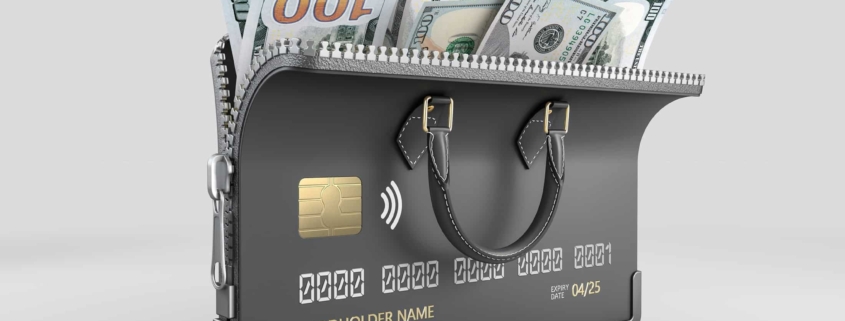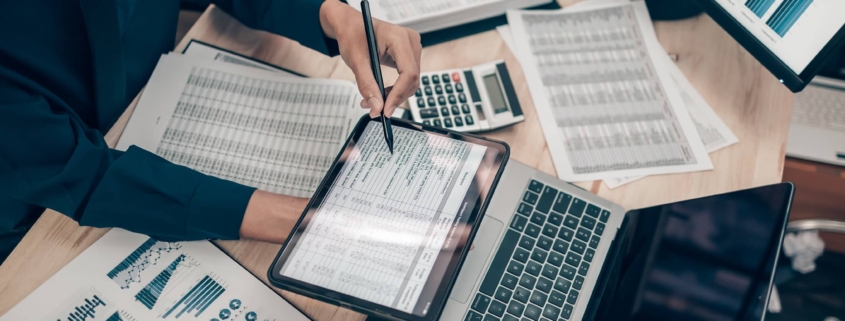As a business owner, financing can play a significant role in expanding your business operations, managing cash flow, and exploring growth opportunities. Many business owners rely on various forms of financing, such as business loans and credit lines, to fund their business ventures. So, understanding the relationship between business and personal credit is essential, as it influences your ability to secure business financing and maintain financial health.
What is Business Credit and How Does it Work?
Business credit refers to the creditworthiness of a business entity. It functions similarly to personal credit but is specific to the business’s financial activities.
Business credit is established when a company borrows money or opens credit accounts with suppliers and lenders. These activities are reported to business credit bureaus, which compile credit reports and generate business credit scores.
Business credit is vital for various purposes, including securing loans, obtaining favorable terms with suppliers, and building a solid financial reputation. Lenders and vendors often assess your business credit to determine the risk of extending credit or loans. A strong business credit score might lead to better financing options and lower interest rates.
Why is Business Credit Important?
Business credit is essential for obtaining financing and managing business growth effectively.
For small business owners, a good business credit score could be the key to securing a small business loan, line of credit, or corporate credit card. This financing can be used to purchase inventory, hire staff, or invest in marketing and expansion.
Strong business credit could also help separate your personal and business finances, reducing the risk of personal liability for business debts.
How to Check Your Business Credit Score
Checking your business credit score is a straightforward process. There are several websites which allow you to check your business credit report. These sites include:
- Dun and Bradstreet
- Experian
- Equifax
- Nav
- Data Axle
- CreditSafe
- Tillful
These platforms provide detailed reports on your business’s credit history, helping you understand your credit standing and identify areas for improvement.
Business Credit vs Personal Credit
While business credit and personal credit share some similarities, they operate differently in several key areas. Here’s a comparison of the two:
| BUSINESS CREDIT | PERSONAL CREDIT | |
|---|---|---|
| REPORTING AGENCIES | Dun and Bradstreet, Experian, Equifax Business | Experian, Equifax, TransUnion |
| SCORE RANGES | 0-100 (D&B PAYDEX), 300-850 (Experian, Equifax) | 300-850 |
| USES | Business Loans, Supplier Credit | Personal loans, Credit Cards, Mortgages |
| LINK TO PERSONAL SSN | No | Yes |
| IMPACT ON PERSONAL CREDIT | Indirect, if personal guarantee is required | Direct |
| LIABILITY | Business Liability | Personal Liability |
How Does Business Credit Affect Personal Credit?
The relationship between business credit and personal credit can be complex, especially for small business owners who may often find their financial worlds overlapping. Generally, business credit does not directly impact personal credit. However, there are several scenarios where the two can be connected, creating an indirect influence that can affect your overall financial health.
For example, when you start a business, your personal credit history might be used to secure initial financing. In this case, lenders often require a personal guarantee, which means you’re personally responsible for repaying the debt if your business fails to do so. If this happens, your credit score becomes a crucial factor in the approval process and the loan terms.
How Do Business Loans Affect Personal Credit?
When you apply for a business loan, lenders may assess your personal credit score, particularly if your business lacks a substantial credit history. This assessment helps lenders evaluate the risk of extending credit to your business.
If you personally guarantee a business loan, you become responsible for the debt. This personal guarantee means that if your business defaults on the loan, the responsibility falls on you, and your personal credit score can suffer as a result.
Repayment behavior on a business loan can also affect your personal credit. If the business loan is reported to personal credit bureaus, the loan amount and repayment status become part of your credit report, influencing your credit utilization ratio and overall credit profile.
How Credit Inquiries Affect Credit Scores
Credit inquiries occur when lenders check your credit report as part of the loan approval process. These inquiries can temporarily lower your credit score. It’s important to manage the number of credit inquiries to minimize negative impacts on your credit score.
How Business Credit Cards Show Up on Your Personal Credit Report
Your credit report is a thorough detailing of several pieces of your financial activity, which sometimes include business credit card information, such as:
New Inquiries
When you apply for a business credit card, the issuer may perform a hard inquiry on your credit report. This can temporarily lower your personal credit score by about five points or less.
Credit Utilization
Business credit card balances may appear on your personal credit report if you provide a personal guarantee. High balances can increase your credit utilization ratio — how much debt you’ve accumulated divided by the credit available to you — potentially lowering your personal credit score.
Payment History
Timely payments on business credit cards help build a positive payment history. Conversely, missed payments can negatively affect both your business and personal credit scores.
Personal Guarantee
Some business credit cards require a personal guarantee, meaning you’re personally liable for the debt. If the business cannot pay, the responsibility falls on you, impacting your personal credit.
How to Establish Business Credit
To establish business credit, follow these steps:
- Register your business legally (LLC, corporation, etc.).
- Obtain a Federal Employer Identification Number (EIN) from the IRS.
- Open a business bank account.
- Apply for a business credit card, line of credit, or loan.
- Establish trade lines with suppliers and vendors.
- Ensure timely payments to build a positive credit history.
How to Build Business Credit
Building business credit involves consistent financial management and strategic credit use. Here are some strategies:
- Pay bills on time to build a positive payment history.
- Keep credit card balances low to maintain a good credit utilization ratio.
- Regularly monitor your business credit report for accuracy.
- Establish multiple credit accounts to diversify your credit profile.
By understanding the nuances of business and personal credit, you should be able to effectively manage both to support your business’s growth and maintain your financial health.
Business Credit FAQs
Does business credit show up on your personal credit report?
Business credit generally does not appear on your personal credit report unless you have provided a personal guarantee.
Does having a company credit card affect my credit?
If you’ve provided a personal guarantee for the company credit card, its activity can affect your personal credit. Otherwise, card activity won’t impact your personal credit.
Can my LLC affect my personal credit?
Your LLC can affect your personal credit if you’ve personally guaranteed loans or credit accounts for the business.
Is a business credit score linked to my personal credit score?
While business and personal credit scores are separate, they can be linked through personal guarantees and shared financial responsibilities.






What is in a Business Credit Report?
Credit bureaus track business credit activity through your EIN (employee identification number); or, if you have one, your D.U.N.S. number. Business credit reporting agency, Dun & Bradstreet, issues this identification number, and it’s free for businesses that have to register with the federal government to receive contracts or grants.1
This information helps build your credit report, which contains details on reported past and current borrowing arrangements. These include loans, credit lines, credit cards, and mortgages. The report may also include information on judgments, liens, and any accounts that may have gone to collections agencies. Your business credit report will also include a credit score, which generally represents how the issuing agency views your business’ ability to make payments on time and in full.2
How Lenders Use a Business Credit Report
Lenders use the information in your business credit report to help inform financing decisions for credit applications from businesses. They may take into account your business credit score, payment history, length of credit history, and any derogatory or negative information.
Why You Should Request Yours
It’s important to see the information on your business credit report to ensure that it is accurate. If you find that it is not, contact the reporting companies to have it corrected. Incorrect information could negatively impact your next loan application.
Seeing what lenders will see on your report can also give you the opportunity to prepare to explain any unusual or less-than-desirable information on your business credit report. And it also gives you an idea of areas for improvement, such as paying bills on time or keeping credit card balances within limit. These steps will make it easier to qualify for business financial vehicles like a term loan or business line of credit.
7 Business Credit Report Providers
If you’re curious about what’s in your business credit report, check out these seven providers. We’ve included five that offer reports for free.
#1. Experian
One of the better known personal credit bureaus in North America, Experian, also offers paid business credit reporting services. Experian offers a one-time business report which includes a credit summary report, credit score, and business summary for one business. Or, you can choose a monthly or annual service with the ability to check your own business credit reporting and business information. Through the service, you can also check details on other businesses (such as your existing or potential customers).
#2. Equifax
Operating across the globe, Equifax offers an entire suite of business credit reporting services for businesses large and small. While they don’t currently offer a free report checking service, their Business Risk Monitor for Small Business Service provides Public Record, Credit, and Risk Score email alerts to notify customers of activities and inquiries impacting their business credit in these areas.
#3. Dun & Bradstreet
The CreditSignal site operated by business credit bureau giant, Dun & Bradstreet, lets you monitor changes to your Dun & Bradstreet business scores and ratings — for free. It also notifies you either through email notifications, or via an app, when someone else requests access to your business score. However, take note — to get your actual business credit score you’ll need a paid subscription.
#4. Nav
Credit monitoring system, Nav, gives both individuals and businesses access to free credit summaries. Check your business report summaries from Experian and Dun & Bradstreet — you don’t even need to provide a credit card number to do so. Yet, bear in mind that these are only summaries. If you want access to more detailed business credit information, you’ll need the paid service.
#5. Credit.net
Although free access to your report through the Credit.net website is limited to a seven-day free trial, it’s a good place to start if you want to get a look at your current business credit situation, plus check credit summaries on others. During this time you’ll have access to seven reports. With the extra reports, you may want to consider checking credit reports on customers looking for credit terms with your own business.
#6. CreditSafe
Here’s another online option that lets you access a free report before committing to a longer-term paid arrangement. With a customized CreditSafe free trial, you’ll have access to credit scores and limits, company financials, adverse credit insights and more for not only your own business, but other businesses as well.
#7. Tillful
Tillful is on a mission to help small businesses reach their full potential by giving them free access to their credit score so owners know where they stand when it’s time to get business financing. With the Tillfull business credit reporting ecosystem, you can access your credit score and learn how it’s measured. You can also connect as many bank and business credit accounts that you want to get a holistic view of business credit. You can access this system as often as you’d like and you can even sign up for email monitoring alerts to let you know in real-time when a change has been made.